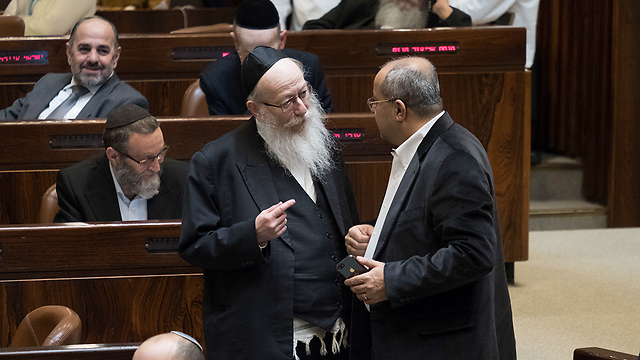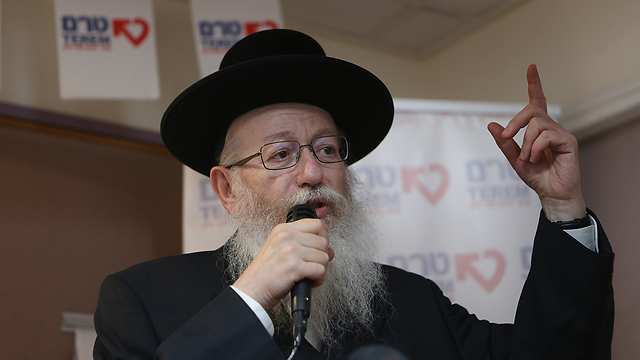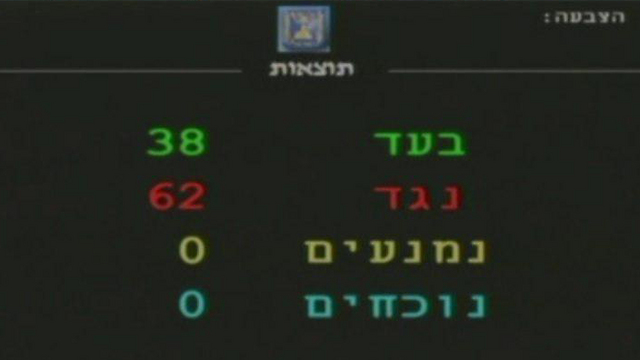
The Knesset passed legislation on Wednesday that would allow ultra-Orthodox MK Yaakov Litzman to return to the helm of the Health Ministry as a deputy minister with a minister's powers.
Litzman was then promptly appointed Deputy Health Minister.
Pleased with his appointment, Litzman said that he is "returning to serve the public full time and with a sense of mission."
But while the bill was approved with a 62-38 majority, the opposition was still able to catch the coalition off guard.
Taking advantage of the fact the coalition did not have a majority in the plenum, the opposition's parties withdrew all reservations to the bill without warning and requested that the voting begin immediately.
Bayit Yehudi's Knesset members were in Havat Gilad, attending the funeral of Tuesday's terror attack victim Raziel Shevah, and Shas MKs were an event celebrating the birth of party leader Aryeh Deri's granddaughter.
The unpleasant surprise, which coalition members dubbed as insensitive, was initiated by head of the Zionist Union faction in the Knesset, MK Yoel Hasson, and Yesh Atid faction head MK Ofer Shelah.
But the opposition's plan was thwarted by independent MK Orly Levy-Abekasis who stalled for time, delaying the vote.
While Levy-Abekasis was speaking at the podium, coalition heads rushed to phone the missing MKs, ordering them to quickly return to the Knesset for the vote. The coalition needed a 61 MK majority to pass the legislation, an amendment to a Basic Law.
Litzman resigned as health minister in late November over government-approved train works done on Shabbat, leading to a crisis with the Haredi parties in the coalition.
The bill, which was proposed by Justice Minister Ayelet Shaked, seeks to resolve the crisis by restoring Litzman to the helm of the Health Ministry as a deputy minister with the same powers and authorities as a minister.
The legislation is the result of a 2015 ruling by the High Court of Justice that determined the arrangement according to which Litzman was able to serve as a deputy minister with ministerial powers was illegal. This left Litzman with no choice but to take on the position of minister.
While Sephardic Haredi government members, such as Shas's Aryeh Deri, have and do serve as ministers, there has not been an Ashkenazi minister in decades, until Litzman's recent tenure.
This was due to a religious decree by leading Ashkenazi rabbis that forbade its leaders from accepting a ministerial position, as it would formally mean they would support and take responsibility for all of the government's decisions—including such decisions that go against their beliefs, such as government-sanctioned works done on Shabbat.

This amendment followed Tuesday's passing of the supermarkets bill, a battle that split the coalition and led Prime Minister Benjamin Netanyahu to send a clear message to the ultra-Orthodox parties—and to clarify who he sees as his greatest rival in the next elections.
The process of enacting the supermarkets bill was long and exhausting, lasting through the night and ending only after 7 am the next day.
During this time, Netanyahu tried to advance an amended version of the bill, in order to shorten the process, but the ultra-Orthodox MKs rejected the proposal out of hand.
"You and us are constantly getting bashed over this bill," MK Uri Maklev of United Torah Judaism (UTJ) told Netanyahu. "Let's finish this now and avoid another week of this."
Netanyahu, it seems, has internalized the message well.
"At the end of the vote, he approached our group of Knesset members," a source within UTJ told Ynet. "He looked tired, and angry at the whole process, and told Maklev: 'That's it, we're done with all your bills. You're just strengthening Lapid this way."
But the ultra-Orthodox parties do not intend to accede to Netanyahu's request—and their next goal is to amend the draft law.
"This law is close to our hearts," said the source within UTJ. "We are working on it with full vigor, and we have no intention of abandoning it."


















